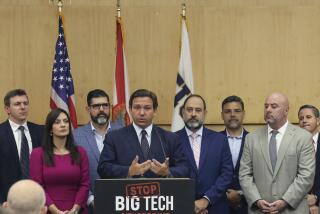Ruling on violent video games: Score one for 1st Amendment
The Supreme Court took almost eight months to render a decision in a case challenging California’s law banning the sale of violent video games to minors. The wait was worth it, and not just for the video-game industry. In striking down the law, the court bolstered anew the protections of the 1st Amendment.
Although seven justices voted to invalidate the law, it was five led by Antonin Scalia who grounded the decision in a compelling opinion that examined new technology through the prism of the 1st Amendment. (Scalia was joined in his opinion by conservative Anthony M. Kennedy and liberals Ruth Bader Ginsburg, Sonia Sotomayor and Elena Kagan — a reminder that free-speech cases often scramble the usual liberal-conservative alliances.)
Scalia dispatched all of the major arguments for the law. A technical but vital issue was whether the court must look at the law with “strict scrutiny,” the practice in other free-speech cases. Scalia answered yes, meaning that the law had to serve a compelling state interest and be narrowly tailored to meet that purpose. Scalia found no such interest in the protection of children from imaginary violence. He ridiculed studies relied on by the state to show a link between playing video games and aggression in children. Referring to one expert, Scalia said that “he admits that the same effects have been found when children watch cartoons starring Bugs Bunny or the Road Runner.”
The other major accomplishment of Scalia’s opinion was to fend off a theory that would have created a new loophole in the protections afforded to free speech. Sexually explicit materials sold or given to minor are considered legally obscene — and outside the protection of the 1st Amendment — even if the materials wouldn’t be obscene for adults. The state wanted the court to treat violent materials provided to minors as unprotected; Scalia, for the court, declined. The case law on obscenity is confused enough; there is no need for another category of unprotected speech. And if fictional violence is treated as illegal speech, the effects surely would soon creep beyond video games and beyond children.
This decision will be unpopular with many, as was the court’s decision upholding the right of hateful protesters to picket near military funerals. What the rulings have in common is an unyielding commitment to free speech that has served the nation well. As for parents who want to protect their children from unsuitable entertainment, this decision does not prevent them from laying down the law.
More to Read
A cure for the common opinion
Get thought-provoking perspectives with our weekly newsletter.
You may occasionally receive promotional content from the Los Angeles Times.






